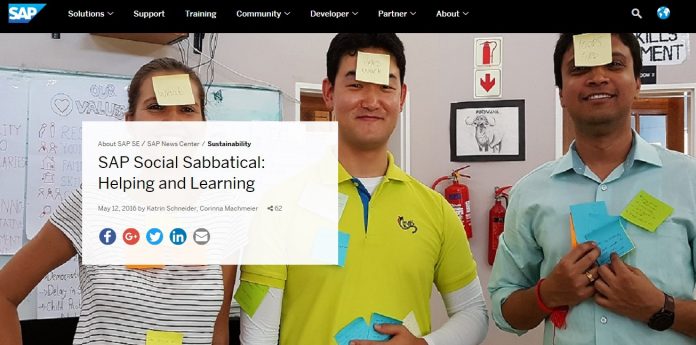Social sabbatical refers to social work, done away from the regular work schedule, for the general good of the society.
We live in an age where life is on a treadmill. We have to keep running to maintain our position, else risk falling. Work hours have become longer than ever, and decisions at work are made real quick! Hence, we are expected to act swiftly on each and every task that lands on our desk, on each thought that crosses the mind. Simply put, one has to stay alert always.
In this action-filled highway, many of us lack the time and space to pursue our areas of interest beyond work. At times, we need some space to recharge and return to running the marathon again, with renewed vigour. The sabbatical has become the innovation of the decade in HR circuits to help keep this action-filled highway free of accidents.
Organisations allow their employees take a break from work to pursue whatever they feel strongly about. It could be volunteering, entrepreneurship, writing a book, making a film, higher studies or just tuning into a pastime that could enrich life at work. This policy has proved to be a great tool for HR managers and line managers to retain and engage their high performers. Some organisations offer this as a paid sabbatical to their high potentials and strengthen their employer brand. The central idea is to communicate how much they value their key talent.
At SAP Labs, over 90 per cent of the employees who have availed the facility claim to be better motivated. Hence, they are more likely to spread a positive word of mouth. Further, these employees delivered higher levels of customer satisfaction. The employees who performed jobs of their interest while on sabbatical, exhibited better leadership skills, team spirit, problem-solving abilities, cultural awareness and other soft skills.
Raghuram Rajan is one of the most recent examples. He was the Professor of Finance at the University of Chicago for nearly seven years and has been on a sabbatical to be the Governor of RBI for three years!
Several other organisations around the world have adopted such an employee-focussed approach.
Industry sectors, such as services, education, healthcare, research, government and social work have used the sabbatical as an effective motivational method for long. Raghuram Rajan is one of the most recent examples. He was the Professor of Finance at the University of Chicago for nearly seven years and has been on a sabbatical to be the Governor of RBI for three years!
Social sabbatical refers to indulging in social work while staying away from the regular schedule at work, doing something valuable for the society—working with the challenges of the underdeveloped world, preserving the natural resources under threat or trying to work with groups to combat a social evil. Whatever the activity or situation may be, people get a chance to learn several life skills first-hand and also significantly broaden their horizons. In roles involving creativity, leadership, innovation, cross-cultural working and social sensitivity, a person is required to possess a wide perspective of the diversity existing in the world. Skills and abilities, such as listening intently to different stakeholders and appreciating their points of view; courageously accepting one’s limitations and using one’s strengths efficiently, are truly advantageous. HR folks in organisations need to create opportunities for their high-potentials in such a way that they are aware of their strengths and limitations, confident of their abilities, sensitive while dealing with their stakeholders, and spirited enough to ride the waves that confront them.
In an environment away from work and colleagues, a person drops all inhibitions and is not afraid to take risks or fail. The stakes are high but the enormity of the situation does not unsettle the person. While the learning is definitely fast, it is also deeply ingrained in the learner’s character.
A social sabbatical allows the person to be exposed to all of these challenges and learn with humility. In an environment away from work and colleagues, a person drops all inhibitions and is not afraid to take risks or fail. The stakes are high but the enormity of the situation does not unsettle the person. While the learning is definitely fast, it is also deeply ingrained in the learner’s character. The impact is visible at work rather quickly. Not only do the individuals experience a sense of achievement but also build a deeper connect with the community they live in along with a long-term orientation in their mind.
In today’s world, not only has the average tenure of a CEO declined but even the stock markets have been increasingly punishing of a CEO in case of a blip in performance. While it is clear in this context, that long-term orientation is not the second nature of any CEO, for the sake of the organisation’s sustainability and purpose, it is critical for the leader to thinks of the longer term. This is yet another reason why the social sabbatical is a great idea!
No wonder many progressive companies have embraced this tool to retain, develop and engage their key talent. Although it demands tremendous commitment from the Board, to make such a huge investment in the company, those doing it help their organisations leap from ‘good’ to ‘great’!
(The author is a senior HR professional.)
Value our content... contribute towards our growth. Even a small contribution a month would be of great help for us.
Since eight years, we have been serving the industry through daily news and stories. Our content is free for all and we plan to keep it that way.
Support HRKatha. Pay Here (All it takes is a minute)




































